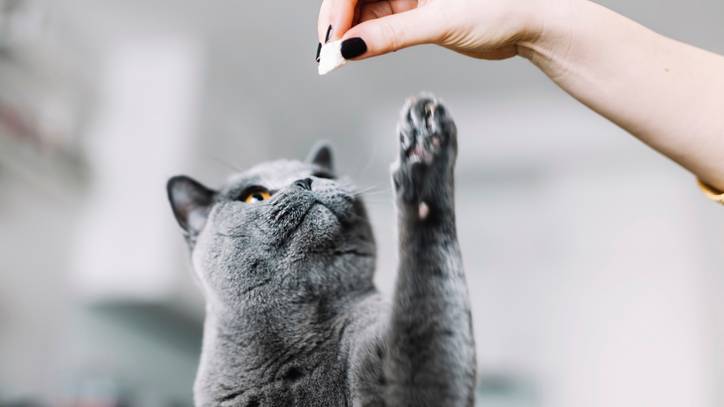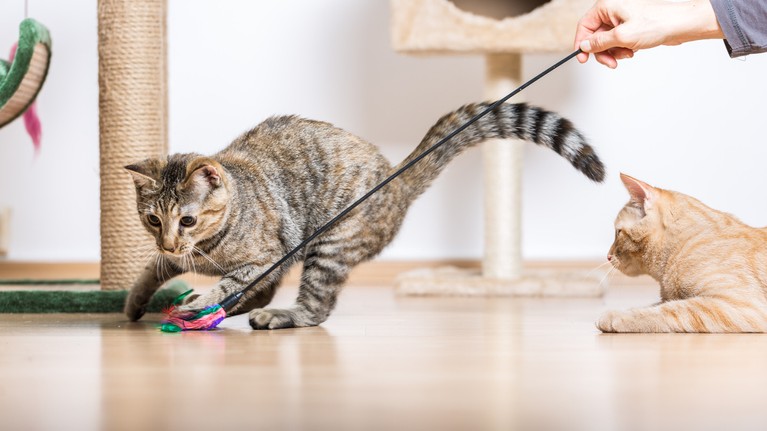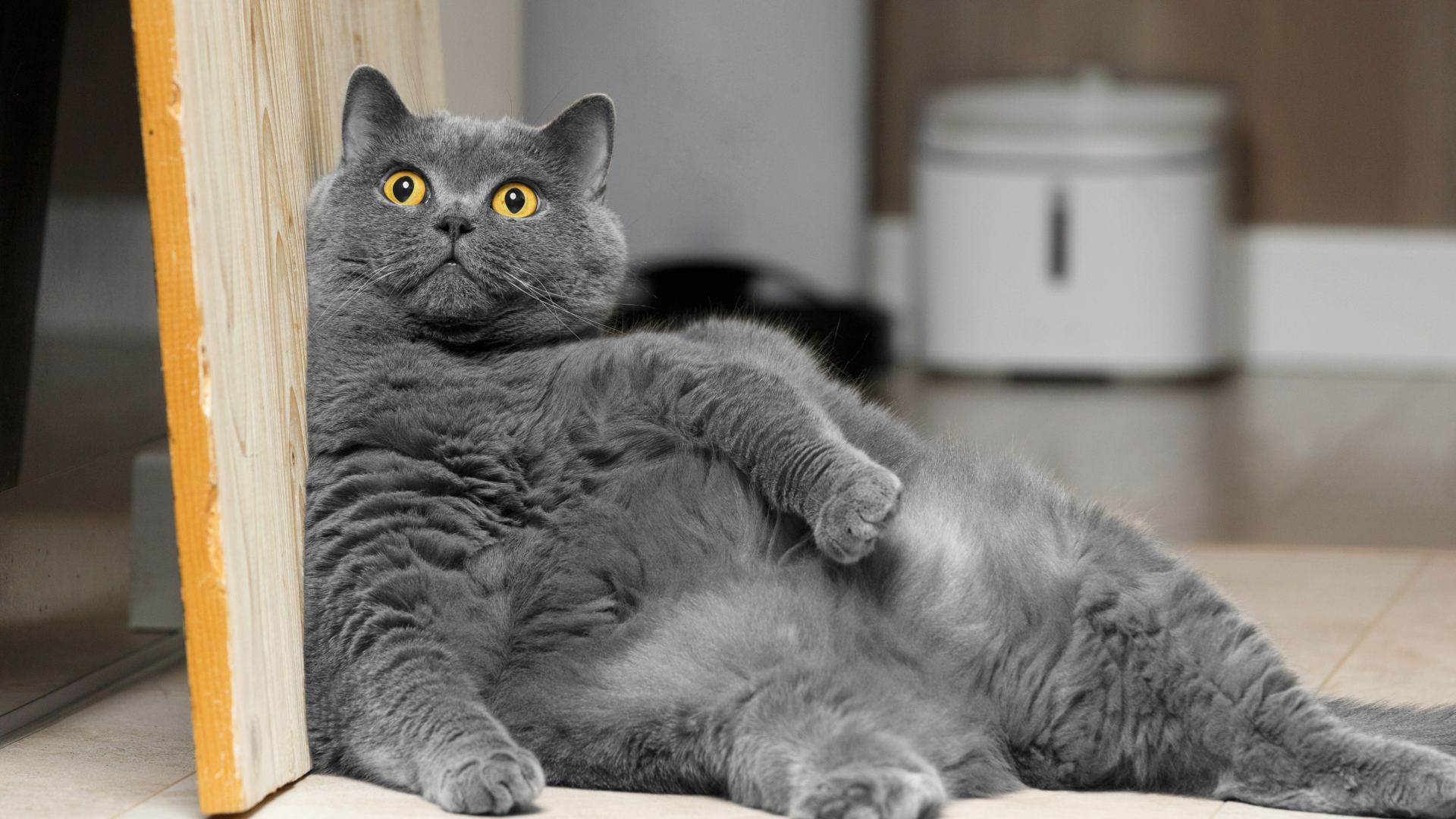Are cats playful? Six insights into a cat's play behavior
Are cats playful? Our feline friends are often considered aloof, but there's so much more to a cat than being lazy.

Sometimes, our feline friends get a little misunderstood. If you're wondering, 'Are cats playful?', you could be picturing your potential pet as Garfield, lazing around the home eating!
It's true that cats love to sleep, and they also enjoy periods of time alone hidden away in cozy corners, but there's much more to cats than the popular perception of aloof behavior suggests.
Generally, felines do love to play and, what's more, it's actually rather good for them. If you'd like to know about more about why cats should play, our guide to the importance of cat play outlines the benefits for both cat and owner.
As with any pet though, every feline has their own individual personality, so be prepared for a snub or two!
They may not always be willing to spring into action, but cats are wired to enjoy play that mimics their natural behavior in the wild.
In fact, the best cat toys are ones that simulate hunting behavior and coax your furry friend to play using their own natural instincts. Think: feather wands and catnip mice that look just as enticing as their real life counterparts. You might also want to learn how to teach a cat a trick.
Are cats playful depends on a number of factors, including environment, age and time of day. This guide will help you decode a cat's behavior and get the best play style for your feline.
Are cats playful pets?
Cats do make for playful pets. Contary to their lazy image, cats can be very energetic. Felines are well-known for zoomies, which are spontaneous bouts of energy that may see your kitty go from chill to maximum energy in a short space of time.
You've likely heard of catnip too, which often makes felines dart around and act rather crazy.
Cats need to expel energy for much the same reason that dogs too. Indoor cats in particular are prone to putting on weight and felines can get bored often leading to the onset of common cat behavior problems.
If you're concerned that your indoor feline is missing physical and mental stimulation, we've compiled some great tips on how to entertain indoor cats. You might even find that your cat wants to play all the time.
Factors that affect a cat's play behavior

1. Age
Many people know that kittens just love to play. It helps them develop natural behaviors like hunting prey and allows them to learn vital communication skills they'll take into adulthood. However, as cats age, they'll begin to lose that energy and start to settle down.
From around 7 years of age, cats lose that drive for play as they become more accustomed to their environment.
2. Breed
Cats come in all sizes. Every feline has their own unique personality but breed can also be a determining factor in whether your cat likes to play.
Playful cat breeds that burst with energy include the Bengal, the Japanese Bobcat, the Abyssinian, Devon Rex, the Birman, the Manx, the Munchkin, Siamese, Burmese, Siberian, and Turkish Van.
Lazier breeds include the Ragdoll, Persian, British Shorthair, Exotic Shorthair and Chartreux.
It's essential to do your research and choose the right cat breed for you and your home.
3. Mood
Playful behavior is always a good sign of a happy cat. It means they're in the presence of a human they trust and are healthy and active.
If you find your cat isn't motivated to play, there are a few things to do to switch up your playing style to make it more appealing for your feline.
Rotating your cats' toys can make old ones seem exciting again, try catnip toys to appeal to your cat's senses or consider adopting a different play style.
Cats can rarely resist string toys hung from furniture while moving a toy slowly across the floor can evoke hunting behavior.
A cat may also simply need time to adjust to his or her new toys. Cats are notoriously fussy and may not take to a toy immediately. We fully suggest you persist with cat toys several times after buying them. Some don’t have instant appeal, and many cats are nervous about changes to their environment, so something like a new scratching post may intimidate them to start with.
4. Time of day
Are cats playful in the afternoon? Not typically. Felines are crepuscular animals, which means they're most active in the twilight hours. Some cats who spend a lot of time outdoors may become most active at night as this when their prey is most likely to be out in force.
You may find your cat loves to sleep all day, but then comes alive for a play session later in the evening.
5. Health issues
If your feline was playful but suddenly stops, it could be a sign of a health issue. It's worth talking to your veterinarian if you notice your cat has become inactive or lethargic and they may run a few tests to check for common issues, such as a urinary tract infection.
Obesity in cats can also cause your feline to be more lethargic than usual; it's important to maintain a healthy diet and to encourage them to play through plenty of toys, the inclusion of a cat tower or climbing walls and access to the outdoors where possible.
6. Stress
Cats are sensitive to changes in their environment. If you've recently moved to a new home or taken on a new pet, stress may cause a cat to stop playing. Even moving furniture can cause your kitty to adopt different behavior.
There are a few signs you can look out for that indicate your feline may be stressed. These include a generable noticeable change in your cat's behavior, toileting outside of their litter tray, excessive scratching, meowing or grooming, withdrawal, pacing or an unresponsiveness to their surroundings.
Ensure you cat has all the resources they need and that you introduce them to any new environment, including the arrival of any new pets, gradually. Try to maintain a regular routine and surround them with familiar things they love.
If you're looking to change up your home décor, for instance, you can use their favorite throw over any new furniture.
How to tell if a cat is being playful
Are cats playful in your presence? There's a few useful indicators that let you know your feline is ready to spring into action. When cats are feeling playful, they'll often showcase their wild traits.
Using a feather cat wand is a great way to test if a feline is feeling in a playful mood. Can cats play fetch? The answer is yes! It’s another fun game that you can teach your feline.
You don't need to be avert with it, simply slowly move the feather wand across the floor like its prey. A cat ready to play will immediately become alert with their ears forward and their tail up, with a steadfast focus that says "Beware."
Often, they'll crouch down with their rear end raised. This means they're ready to pounce and grab the 'predator' at a moment's notice.
Wondering why your cat watches TV? This feature has the answer and whether it can be a form of play. If you let your cat play with yarn, this feature explains why it’s not such a good idea.
PetsRadar Newsletter
Get the best advice, tips and top tech for your beloved Pets

Ashleigh is Digital Editor on PetsRadar. With over 8 years of experience in print and digital media, she has acted as an editorial lead on a variety of projects, with animal themes a keen interest. As an avid animal lover, you can often find Ashleigh checking out the newest trends in animal care or looking at cute cat videos on TikTok.
